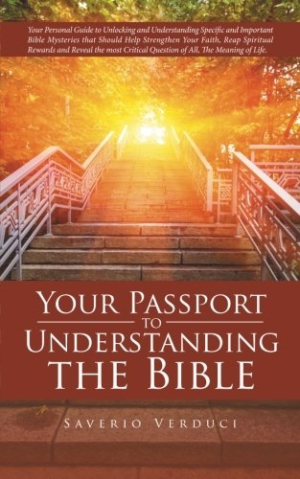It looks like you've stumbled upon a page meant to be read by our code instead of viewed directly. You're probably looking for this page.
Your Passport to Understanding the Bible
Verduci’s book is a diverse introduction to the Bible and to biblical thought, and his synopses may prove to be a valuable place to start understanding it.
Saverio Verduci’s Your Passport to Understanding the Bible is a concise and insightful interpretive work that uses a mixture of science and faith to explain biblical lessons, all in accordance with the author’s evangelical beliefs.
This well-organized book features detailed summaries of each book of the Bible with the aim of translating the language of the Bible to modern times. Other chapters express Verduci’s interpretations of the Bible and his beliefs about how the Bible has shaped the world.
Verduci seeks to confront what he feels are common misconceptions about the Bible—as with how the saying “Money is the root of all evil” is incorrectly thought to be a Bible verse.
Verduci is an evangelical Christian, but his ideas sometimes deviate from standard notions—notably, concerning heaven and hell. He asserts that there are three levels of heaven, and that hell is not fire and brimstone as presented in popular culture. Such notions are thought-provoking.
In addition to presenting his personal opinions, in the latter portion of the text Verduci advocates for marrying beliefs in science and religion. He writes that “Bible science’’ is prominent in the Bible, citing examples.
Verduci often notes the intriguing theory that since science is imperfect, it’s hard to believe scientific theories about God are infallible. He uses mathematical equations to try to show that the big bang theory is a fallacy. Such equations are long and complicated, though, and will prove hard to work through for those not familiar with advanced math.
Scientists’ words are made to tie in to belief in God, but without clear evidence, as with an interpretation of physicist Max Planck’s work that is presented without the support of citations or proofs.
Though the book covers a heavy subject, Verduci’s writing is alternately scholarly and conversational. He presents complex subjects with subtlety and pathos. He writes emotionally about how studying the Bible helped him heal after the death of his parents. The author’s personal reasons for believing in the Bible are written in a heartfelt and poignant manner when he explains how the Bible gave him more clarity in his life.
In a book with various thrusts, Verduci’s simple explanations of the books of the Bible provide deeper context, resulting in a valuable guide.
Reviewed by
Ella Vincent
Disclosure: This article is not an endorsement, but a review. The publisher of this book provided free copies of the book and paid a small fee to have their book reviewed by a professional reviewer. Foreword Reviews and Clarion Reviews make no guarantee that the publisher will receive a positive review. Foreword Magazine, Inc. is disclosing this in accordance with the Federal Trade Commission’s 16 CFR, Part 255.
